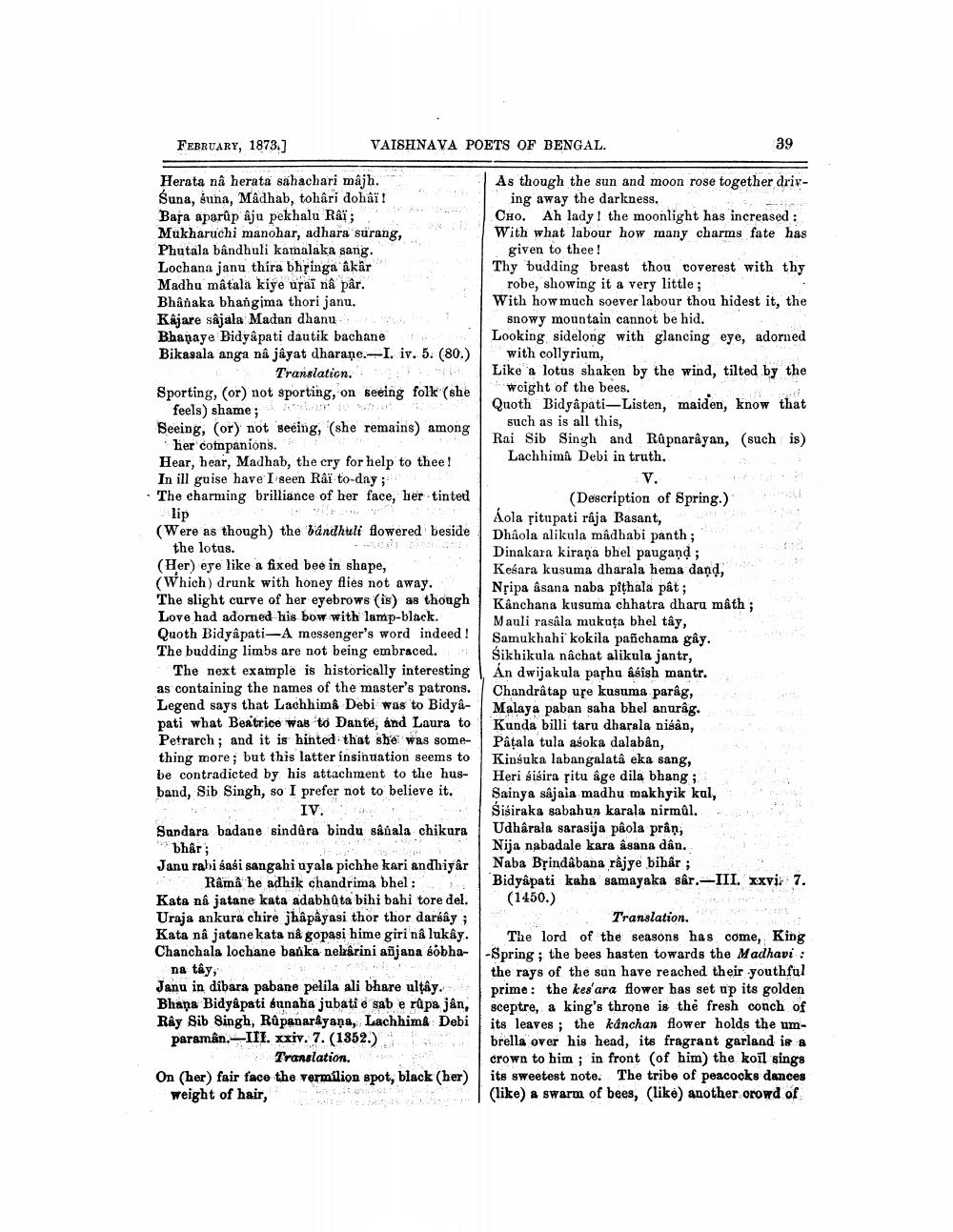________________
FEBRUARY, 1873.]
VAISHNAVA POETS OF BENGAL.
39
As though the sun and moon rose together driv
ing away the darkness. Cho. Ah lady! the moonlight has increased : With what labour how many charms fate has
given to thee! Thy budding breast thou coverest with thy
robe, showing it a very little ; With how much soever labour thou hidest it, the
snowy mountain cannot be hid. Looking sidelong with glancing eye, adorned
with collyrium, Like a lotus shaken by the wind, tilted by the
Woight of the bees. Quoth Bidyâpati - Listen, maiden, know that
such as is all this, Rai Sib Singh and Rûpnarayan, (such is)
Lachhimâ Debi in truth.
Herata na herata sahachari mâjh. Suna, buna, Madhab, tohâri dohai! Bara aparüp âju pekhalu Rai; Mukharuchi manohar, adhara surang, Phutala bândhuli kamalaka sang. Lochana janu thira bhpinga âkâr Madhu matala kiye usaï nå pår. Bhânaka bhangima thori janu. Kâjare sâjala Madan dhanu Bhanaye Bidyâ pati dautik bachane Bikasala anga na jâyat dharane.--I. iv. 5. (80.)
Translation. Sporting, (or) not sporting, on seeing folk (she
feels) shame; Beeing, (or) not seeing, (she remains) among
her companions. Hear, hear, Madhab, the cry for help to thee!
In ill guise have I seen Rai to-day; · The charming brilliance of her face, her tinted
lip (Were as though) the båndhuli flowered beside
the lotus. (Her) eye like a fixed bee in shape, (Which) drunk with honey flies not away. The slight curve of her eyebrows (is) as though Love had adorned his bow with lamp-black. Quoth Bidyâpati-A messenger's word indeed! The budding limbs are not being embraced.
The next example is historically interesting as containing the names of the master's patrons. Legend says that Lachhima Debi was to Bidyapati what Beatrice was to Dante, and Laura to Petrarch; and it is hinted that she was something more; but this latter insinuation seems to be contradicted by his attachment to the husband, Sib Singh, so I prefer not to believe it.
IV. Sandara badane sindůra bindu sâuala chikura
bhar; Janu rahi sasi sangahi uyala pichhe kari andhiyâr
Râmå he adhik chandrima bhel : Kata na jatane kata adabhta bihi bahi tore del. Uraja ankura chire jhâpâyasi thor thor darbây ; Kata na jatane kata na gopasi hime giri na lukây. Chanchala lochane bauka nekârini ağjana sobha- na tây,
vì t
h ế Janu in dibara pabane pelila ali bhare ultây. Bhana Bidy&pati sunaha jubati e sab e rupa jân, Ray Sib Singh, Rûpanarayaņa, Lachhim& Debi paramân.-III. xxiv. 7. (1852.)
i Translation. On (her) fair face the vermilion spot, black (her)
weight of hair,
(Description of Spring.) Áola pitupati râja Basant, Dhola alikula madhabi panth: Dinakara kiraņa bhel paugand; Kesara kusuma dharala hema dand, Nřipa âsana naba pithala pât; Kanchana kusuma chhatra dharu math; Mauli rasala mukota bhel tây, Samukhahi kokila panchama gây. Sikhikula nâchat alikula jantr, An dwijakula pashu asish mantr. Chandratap ure kuguma parág, Malaya paban saha bhel anurâg. Kunda billi taru dharala nišân, Patala tula asoka dalaban, Kinsuka labangalatâ eka sang, Heri sisira șitu âge dila bhang; Sainya sajaia madhu makhyik kul, Sisiraka sabahun karala nirmal. Udhârala sarasija pâola prân, Nija nabadale kara asana dân. Naba Brindabana râjye bihậr ; Bidyâpati kaha samayaka sâr.-III. xxvi. 7. (1450.) -
Translation. The lord of the seasons has come, King -Spring; the bees hasten towards the Madhavi : the rays of the sun have reached their youthful prime: the kes'ara flower has set up its golden sceptre, a king's throne is the fresh conch of its leaves ; the kânchan flower holds the umbrella over his head, its fragrant garland is a crown to him ; in front of him) the koīl sings its sweetest note. The tribe of peacocks dances (like) a swarm of bees, (like) another orowd of




